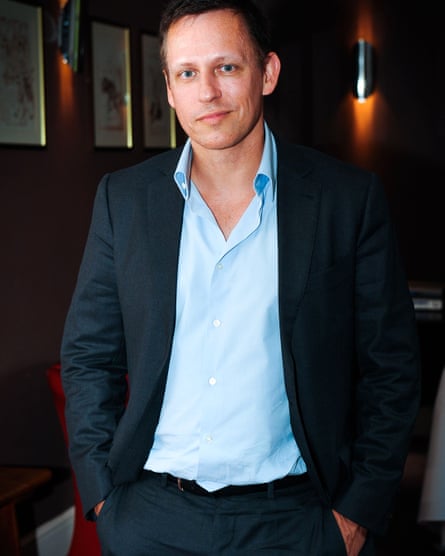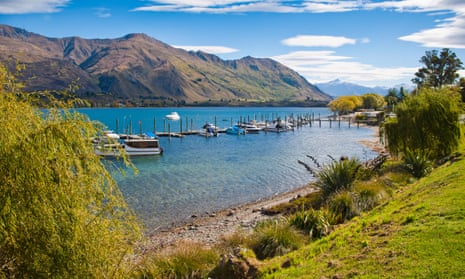At the Republican party convention in Cleveland last July, Trump donor Peter Thiel declared himself ‘“most of all, proud to be an American”. So it came as something of a surprise for New Zealanders to discover that the PayPal co-founder and Facebook board member had become an honorary Kiwi – joining a growing band of wealthy Americans seeking a haven from a possible global apocalypse.
Thiel was recently revealed to have bought a £4.5m lakeside property near the New Zealand town of Wanaka in 2015. When New Zealand Herald reporter Matt Nippert asked why Thiel had been allowed to buy land that appears to fit the classification of “sensitive” without permission from the country’s Overseas Investment Office, he was told it wasn’t necessary – Thiel was already a citizen.
The revelation was met with confusion. By the time of his appearance at the Republican convention, Thiel had already bought 193 hectares of pristine South Island land using his rights as a Kiwi. Politicians asked why a billionaire most famous for adamantly supporting Donald Trump and bankrolling the lawsuits that bankrupted Gawker Media had been allowed not only to buy land in New Zealand, but to make the country part of his future and identity. Winston Peters, leader of the New Zealand First party, accused the National government of “selling citizenship” to foreigners.
Thiel, who retains his American citizenship, in fact became a joint US-New Zealand citizen in 2011 and has described the country as “Utopia”, investing heavily in business start-ups.
And he isn’t alone in his admiration for the country. Recent reports in Bloomberg and the New Yorker suggest dozens, if not hundreds, of Silicon Valley futurists are secretly prepping for doomsday. These apocalypse-fearing survivalists are stocking up on canned goods. Investing in solid gold currency. Keeping helicopters fuelled up. Purchasing apartments in nuclear bomb-proof bunkers. And if a SHTF (“shit hits the fan”) scenario unfolds, many have an escape route already in mind: south, south, all the way to New Zealand.

If you want to ride out the apocalypse, there’s no better place. When the rest of the world is imploding, isolation – often thought to be New Zealand’s greatest weakness – becomes its biggest strength. The island nation is too far away to invade, separated from its nearest neighbour by the 2,800km width of the Tasman Sea. Its most serious predator is the possum. If it’s a political revolution you fear, the climate is a far cry from the intractable antagonism of the US. One recent parliamentary debate featured Māori party leader Marama Fox singing a light-hearted politicised version of Santa Baby, accompanied by her colleague on ukulele. Everyone stood up to applaud afterwards.
Tech leaders seem particularly smitten by New Zealand’s reputed immunity to Armageddon. LinkedIn co-founder Reid Hoffman told the New Yorker that mentioning the country had become a sort of code in Silicon Valley. “Saying you’re ‘buying a house in New Zealand’ is kind of a wink, wink, say no more,” he said.
Speaking at the World Economic Forum in Davos, Robert Johnson, president of the Institute for New Economic Thinking, said that he knew “hedge-fund managers all over the world who are buying airstrips and farms in places like New Zealand because they think they need a getaway”.
One entrepreneur estimated 50% of his peers have bought property in New Zealand or elsewhere. Figures from 2016 show that US buyers were second only to Australians in the amount of New Zealand land they purchased. In the year to June last year, 1,288 Americans gained residence in New Zealand, while another 11,873 were issued work or student visas.
“People want to get the hell out of where they are, and they feel that New Zealand is safe,” Auckland immigration agent David Cooper told Bloomberg, adding that the country is a good spot to be in when “the world is going to hell in a handbasket”.
Graham Wall, whose firm Graham Wall Real Estate sold a mansion to Thiel in the tourist hub of Queenstown in 2011, says wealthy overseas buyers see New Zealand as an escape from a volatile world. Though none of his clients has explicitly described their purchase as apocalypse insurance, they’re attracted to the country’s benign legislative environment, lack of corruption and, most of all, its isolation.
“Usually when people are being honest about why, they’ll say the difference New Zealand probably has over everywhere else on Earth is that we can choose our own immigration,” he says. “If you’re in New Zealand, then you’ve been invited in. I think that’s quite a compelling thing for people when they feel a bit unsafe.”
Wealthy US buyers now account for roughly one in 12 of the properties Wall sells – double the amount six months ago. The buyers are driven mainly by the ability to play golf or ride mountain bikes at the weekend. “They’re not like ‘man, the world’s going to end’. But it’s just, ‘the political environment is uncertain’,” he says.
Anxiety over the new US president appears to have many Americans investigating a shift to New Zealand – and not just Silicon Valley survivalists. In the 48 hours after Trump was elected, New Zealand immigration websites saw a 2,500% increase in traffic. Immigration New Zealand received 88,353 visits from the US – up from 2,300 visits a day. The investor-focused New Zealand Now website received 101,000 visits from the US in the same two-day period, compared with its usual daily average of 1,500. Nearly 18,000 US citizens ended up using the website to register an interest in studying, working or investing in New Zealand in November 2016 – up from 1,272 in November 2015.
Steve McGill, who heads the Immigration New Zealand team charged with attracting overseas investors, is hopeful Trump’s election will prompt more nervous ultra-rich to make the journey south. “There’s obviously been a political event in the States that’s seen at least our website taking a lot of extra interest,” he says. He sees the uptick as a big opportunity. “It’s exciting for New Zealand.”
Under Immigration New Zealand’s Investor Plus scheme, foreign buyers can gain permanent residency status – which confers some power to buy property – if they invest NZ$10m (£5.8m) in the country over three years, and live there for at least 44 days in two of those years. The department doesn’t care whether migrants are just trying to doomsday-proof their lives, provided they meet its standards, McGill says.
“I guess one of the great and appealing things about New Zealand is our freedom of expression and our right to free speech. We don’t have any criteria in our policy that says to us ‘don’t let a survivalist in’. If they believe the apocalypse is coming, that’s fine. But they still need to achieve a certain set of criteria.”
Not everyone is so optimistic. Iain Lees-Galloway, immigration spokesman for New Zealand’s opposition Labour party, says government rules should discourage non-resident foreigners from buying properties out of fear. “I think this sort of insurance policy approach is problematic,” he says.
Galloway can understand people wanting to move to New Zealand – whether they’re backlash-fearing Trump supporters, or just worried about some kind of societal breakdown. But he wants new rules limiting government ministers’ ability to grant citizenship – and thus the right to purchase sensitive land – to influential investors like Thiel. That should be accompanied by a ban on non-resident foreign buyers driving up house prices by purchasing existing properties, he says.
“The truth is there is a lot of instability around the world. New Zealand is perceived as a very stable, very safe, very friendly country, so I can imagine that not just wealthy people but all kinds of people will be looking at New Zealand and thinking, ‘I’d like to live there’. We need to be able to respond to that and say we are going to do this on our terms. We are going to respond to the new reality on our terms.”
For Graham Wall, that political uncertainty is a cause for celebration if it drives more investors to New Zealand and on to the books of his real-estate firm. The wealthy are always welcome, whether they see your country as a paradise or a glorified doomsday bunker, he says. Even if they’re fleeing the horsemen of the apocalypse, at least they’re carrying cash in hand.
“It’s all part of a trend. They used to buy villas in the south of France. Now they want a beautiful piece of New Zealand. Long may it last.”

Comments (…)
Sign in or create your Guardian account to join the discussion